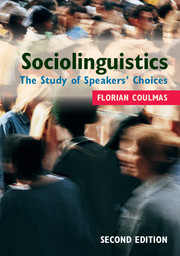Book contents
- Frontmatter
- Contents
- List of figures
- List of tables
- Preface to the second edition
- 1 Introduction: notions of language
- Part I Micro-choices
- Part II Macro-choices
- 7 Code-switching: linguistic choices across language boundaries
- 8 Diglossia and bilingualism: functional restrictions on language choice
- 9 Language spread, shift and maintenance: how groups choose their language
- 10 Language and identity: individual, social, national
- 11 Language planning: communication demands, public choice, utility
- 12 Select letters: a major divide
- 13 The language of choice
- 14 Research ethics
- Glossary of terms
- References
- Index
- References
12 - Select letters: a major divide
Published online by Cambridge University Press: 05 August 2013
- Frontmatter
- Contents
- List of figures
- List of tables
- Preface to the second edition
- 1 Introduction: notions of language
- Part I Micro-choices
- Part II Macro-choices
- 7 Code-switching: linguistic choices across language boundaries
- 8 Diglossia and bilingualism: functional restrictions on language choice
- 9 Language spread, shift and maintenance: how groups choose their language
- 10 Language and identity: individual, social, national
- 11 Language planning: communication demands, public choice, utility
- 12 Select letters: a major divide
- 13 The language of choice
- 14 Research ethics
- Glossary of terms
- References
- Index
- References
Summary
Put writing in your heart that you may protect yourself from hard labour of any kind.
Egyptian scribe of the New KingdomIn the Eskimo language Inuktitut, as it has come to be written in newspapers, relative clauses are actually developing from the ground up, having not existed at all in the language as it was spoken by hunter-gatherers.
McWhorter (2003: 247)Within the global structure of power differentials, languages have a hierarchy.
Prah (2001: 127)Outline of the chapter
This chapter deals with the sociolinguistic meaning of writing as a communication mode that introduces distinction and inequality among both speakers and languages. The oral–written divide has a social dimension in that the gap between ordinary speech and written language is greater for people coming from a socioeconomically disadvantaged background than for their better-off peers. And languages gain through writing prestige, communicative reach and the paraphernalia of power. Typically countries and speech communities have a default writing system representing past choices; however, in many cases the questions of which languages are to be used in writing and how they ought to be written are not settled and are sometimes a matter of controversy. The criteria for selecting a language and variety, a writing system and script, and determining spelling conventions are discussed, and it is shown that, in each case, both instrumental and symbolic considerations come to bear; for, thanks to its visibility, writing serves emblematic functions as an object of attitudes relating to language.
- Type
- Chapter
- Information
- SociolinguisticsThe Study of Speakers' Choices, pp. 225 - 243Publisher: Cambridge University PressPrint publication year: 2013



